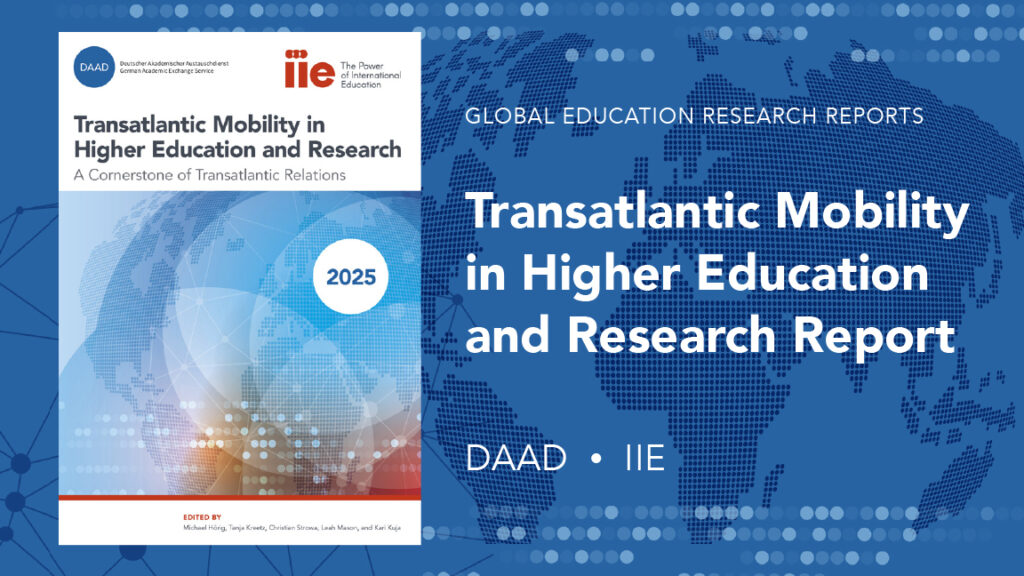The Report Recaps Transatlantic High-Level Roundtable Dialogues and Offers Strategies for Sustaining and Scaling Up Educational Exchange Programs
Gothenburg, Sweden, September 11, 2025 — Today at the European Association for International Education (EAIE) Conference, the Institute of International Education (IIE) partnered with the German Academic Exchange Service (DAAD) to release their first comprehensive joint report about the value of academic and research collaboration between Europe and the United States. Transatlantic Mobility in Higher Education and Research: A Cornerstone of Transatlantic Relations examines the movement of researchers, academics, and students between the United States and Europe over time, placing it in the context of the changing global landscape of today and the future. It also surveys existing partnership-driven exchange programs and case studies from 14 European nations, including Erasmus+ and Horizon Europe.
Transatlantic Mobility in Higher Education and Research: A Cornerstone of Transatlantic Relations
“It is our hope that this report marks the beginning of a regular series, documenting the evolution and enduring importance of transatlantic academic cooperation. Its findings are not intended as a conclusion, but as a starting point,” IIE President Jason Czyz and DAAD President Joybrato Mukherjee write in the foreword.
The report underscores the mutual economic, security, and strategic benefits of academic collaboration between the US and Europe. In the 2023/24 academic year, international students contributed $43.8 billion to the U.S. economy and supported approximately 378,000 jobs, according to NAFSA. More than 90,000 European students were enrolled at U.S. higher education institutions last year, according to the Open Doors Report. And the number of degree-seeking U.S. students in Europe doubled between 2001 and 2023 (50,000+). US-European research collaborations have yielded noteworthy advancements in medicine, physics, technology, and other fields—from detecting gravitational waves for the first time to the founding of Google.
Finally, the report calls for continued investment in diverse mobility formats, policy alignment, and institutional innovation to sustain and grow academic partnerships in an increasingly complex global landscape. IIE and DAAD launched the Transatlantic High-Level Roundtable Dialogue series in 2023 to convene governments and key organizations and explore concrete measures for strengthening and expanding transatlantic cooperation in higher education. The three-part series took place in Brussels (2023), Washington, D.C. (2024), and Lisbon (2025).
2025 marks DAAD’s centennial. IIE provided support for DAAD’s first fellowships for German scholars in its founding year. Since then, DAAD and IIE have collaborated to provide thousands of talented researchers, students, and leaders from Germany, the U.S., and throughout Europe with the opportunity to learn, innovate, and build solutions together.
About DAAD
The German Academic Exchange Service (DAAD) is the world’s largest funding organization for the international exchange of students and scholars. It was founded in 1925 as an organization of German universities and their student bodies. In 2024, the DAAD supported more than 140,000 German and international students and scholars worldwide. DAAD is mainly funded by the German Federal Foreign Office, the Federal Ministry of Research, Technology and Space, the Federal Ministry for Economic Cooperation and Development, and the European Union. It is headquartered in Bonn, with additional offices in Berlin and Brussels. A worldwide network of over 50 regional offices and around 350 lectureships, long-term lecturers and German Studies teachers maintains contact with universities and partner countries across all continents and provides advisory services on the ground.
About the Institute of International Education
The Institute of International Education (IIE) is the leader in designing and implementing international education strategies and program services. We work with governments, policymakers, educators, and employers across the globe to prepare students and professionals for the global workforce and equip them to solve the increasingly complex challenges facing our interconnected world. With support from donors, we also create initiatives that assist students, scholars, and artists whose lives and work are threatened; expand teaching and learning across cultures; and provide life-changing opportunities. A not-for-profit organization founded in 1919, IIE has a network of offices and affiliates worldwide and over 1,600 higher education partners. Visit iie.org.
CONTACTS
Public Affairs
Michael Flacke presse@daad.de
